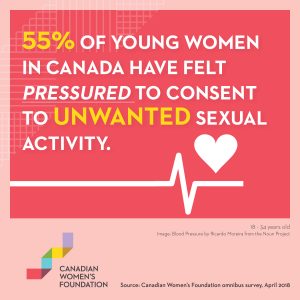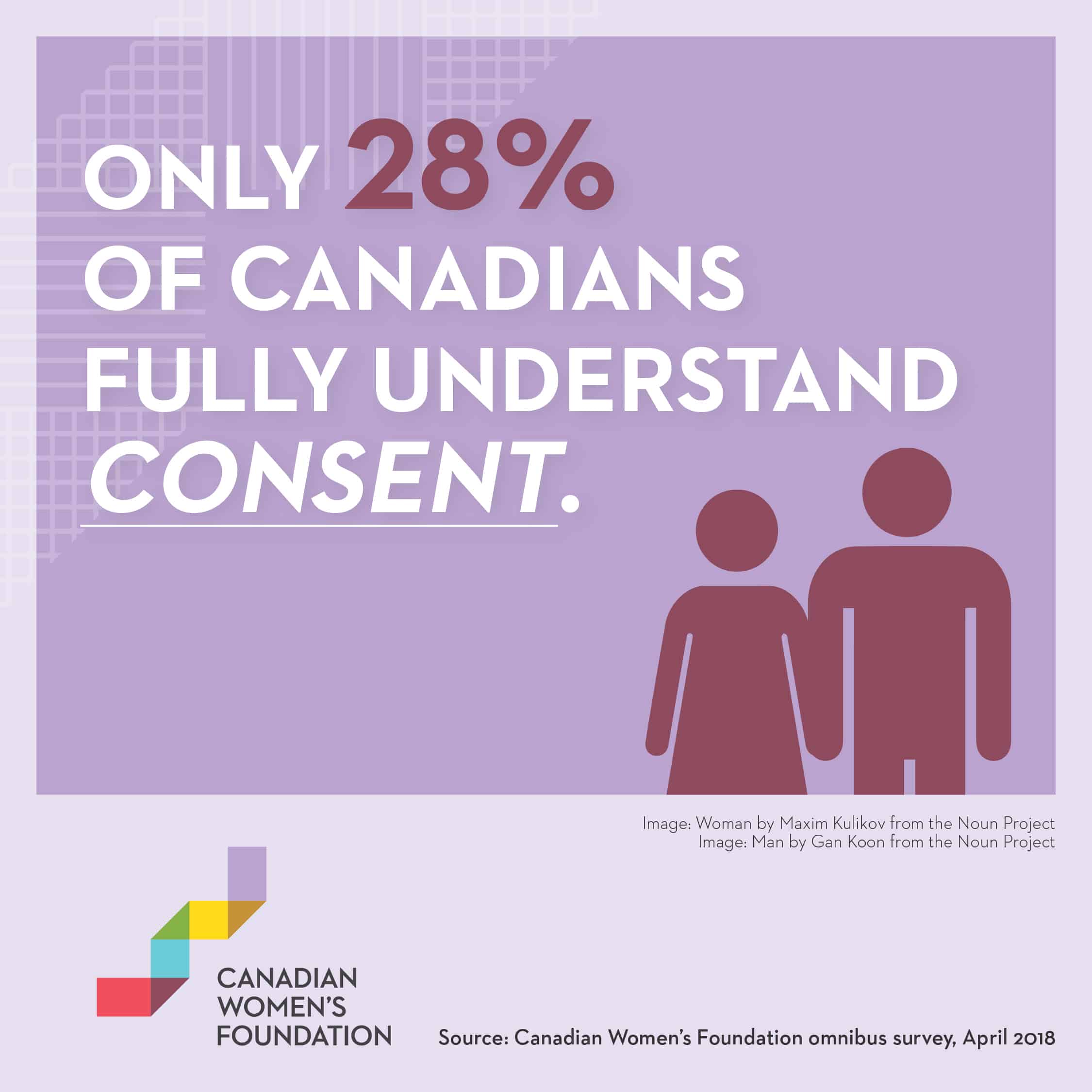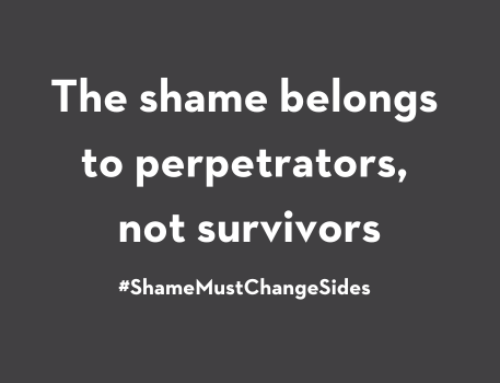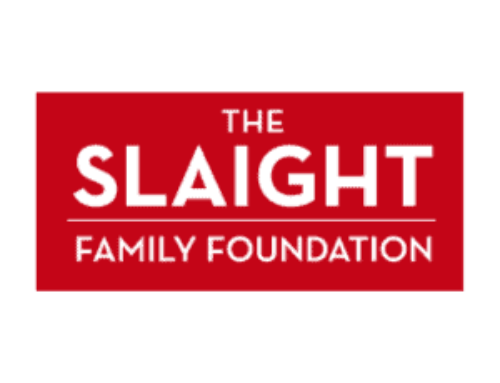This blog was also published in French on Huffington Post Quebec
If you had to define what constitutes consent in sexual situations, what would you say?
Is it something you could explain to your children?
If you’re feeling awkward or hesitating, you’re not alone. And even if you think you know how to define consent, our latest survey at the Canadian Women’s Foundation will challenge your assumptions.
It found that only 28 per cent of Canadians fully understand what constitutes sexual consent. What’s even more troubling, given the revelations of the #MeToo Movement, is that this percentage has actually gone down. In 2015, the Foundation reported that 33 per cent of Canadians fully understood consent.
While the #MeToo Movement has prompted unprecedented conversation around the prevalence of sexual harassment and assault, this survey underlines the urgent need to focus on prevention and education. To prevent sexual harassment and assault, it’s time for us to be having direct conversations about consent.
This year’s survey, which was part of the Foundation’s annual Campaign to End Violence, aimed to gauge how the #MeToo Movement has influenced Canadians’ attitudes on various issues. The question about defining consent asked respondents to choose which factors are needed to ensure sexual activity is consensual. Only 28 per cent recognized that consent should be:
- Verbal (ex: saying yes)
- Behavioural (ex: initiating sexual contact)
- Enthusiastic (ex: undressing themselves, clearly enjoying themselves, wholly participating)
- Ongoing (ex: continuing to provide positive verbal or behavioural cues during the activity)
Although the terms verbal, behavioural, and ongoing are in line with Canada’s legal definition of consent, myths and confusion endure. For example, some might believe that if one partner doesn’t actually say “no” or is silent, there is consent. But sexual situations that cross the line into assault can lead to a range of verbal and non-verbal reactions. Someone who is experiencing sexual assault may involuntarily freeze in response to what they are experiencing and not be able to communicate their refusal.
Given that sexual assault is often committed by someone a woman knows, in the moment she may feel a sense of disbelief or paralysis that someone she cares about is hurting her. Women’s socialization around “being nice” when it comes to conflict may also make it more difficult to speak up. These are just a few reasons why an ongoing two-way exchange is so important. In recent years, many sex educators have been promoting the notion of enthusiastic consent – emphasizing that rather than focusing on “No means no”, sexual partners should focus on “Yes means yes” as a more proactive way of gauging consent.
The crucial need for stronger education around consent is underlined by the fact that 50 per cent of women in Canada have felt pressured to consent to unwanted sexual activity, according to the survey. Of those women, a higher percentage (55 per cent) of those age 18 to 34 said they experienced pressure to consent.
There will be those who think we can’t change our behaviour around consent; that there will always be some uncertainty in sexual situations. People will joke about needing to have legal documents on hand during dates. But we need to recognize consent as a safety issue that everyone has a stake in. We’ve changed how we approach so many other safety issues: wearing seatbelts in cars, not drinking and driving, practising safe sex by using condoms. So why not consent? Given the social and economic costs of sexual assault and other sexual offenses in Canada (an estimated $4.8 billion in 2009 according to the Department of Justice), as well as the potential legal consequences of not understanding it, surely, it’s worth our time and attention.
The good news is that the Foundation’s survey revealed that Canadians of all genders want more clarity around consent. When asked what they see as the most important next step to take in the wake of the #MeToo Movement, nearly half of Canadians (44 per cent) said that it’s educating people about how to get and give consent.
A recent evaluation of the Canadian Women’s Foundation’s Teen Healthy Relationships Program found that 72 per cent of teens were better able to recognize healthy relationships after being in the program, and 66 per cent were better able to say “no” to things that seemed wrong or made them uncomfortable.
It’s these kinds of programs that lay the foundation for healthier, more equal and consensual relationships among the next generation. But we’re only able to fund a small percentage. These programs need to be accessible to every young person across Canada, so that all of them are included in creating a new approach to consent.
The #MeToo Movement is far from over, and the important conversations it started need to evolve — for the sake of our children and future generations.
So, let’s stop assuming that they’ll just figure out how to give and get consent. Let’s get over our awkwardness and start talking about it.
The Canadian Women’s Foundation’s annual Campaign to End Violence supports women’s shelters and violence prevention programs (including teen healthy relationship programs) across Canada.
Learn More:
- Dating a Survivor of Sexual Violence: How to Support Your Partner
- Building a Business Rooted in Self-Love
- Invisible Survivors: Supporting Older Women who Experience Sexual Violence
Take Action:
- Sign up for our e-newsletter to have our latest stories and resources sent to your inbox.
- Follow us on Facebook and Twitter to join a national conversation about gender equality.







